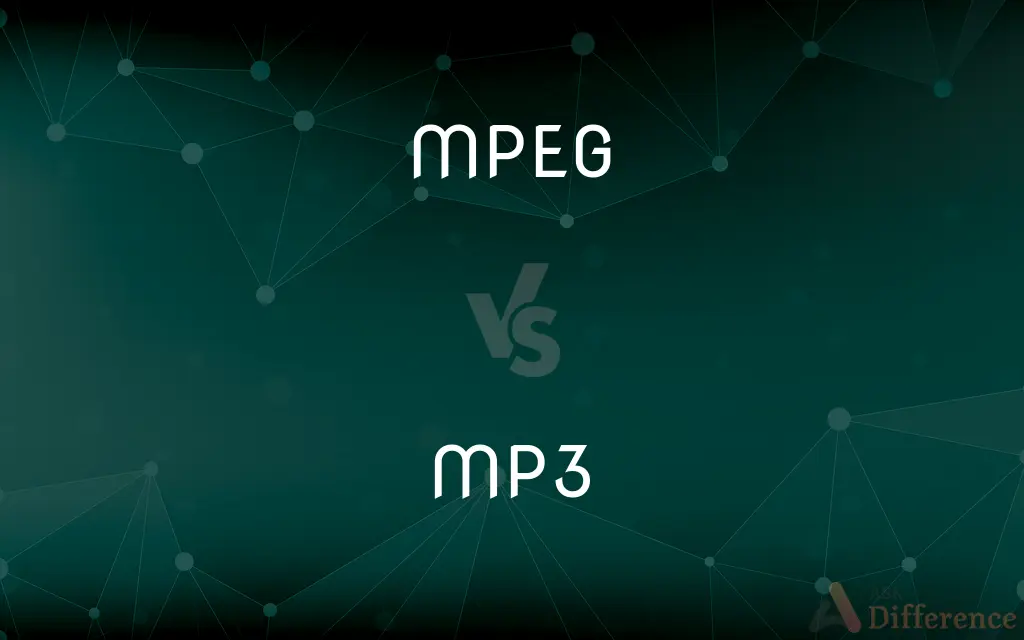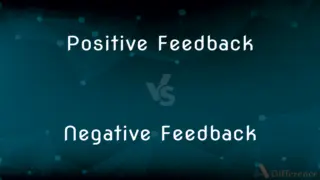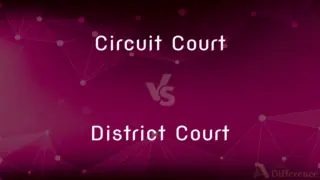MPEG vs. MP3 — What's the Difference?
By Tayyaba Rehman — Published on November 20, 2023
MPEG is a standard for video and audio compression; MP3 is a specific audio format under the MPEG standard.

Difference Between MPEG and MP3
Table of Contents
ADVERTISEMENT
Key Differences
MPEG and MP3 are both developed by the Moving Picture Experts Group, but they serve different primary functions in the realm of digital multimedia. MPEG stands for the "Moving Picture Experts Group," which is a set of standards for video and audio compression. These standards were developed to cater to the need for digital video and audio streaming and storage.
On the other hand, MP3, which stands for "MPEG Audio Layer III," is a specific audio coding format within the MPEG set of standards. MP3 is designed to compress audio sequences into a file that's just a fraction of its original size, with minimal loss in sound quality. This revolutionized the digital music industry as it allowed for the easy storage and transmission of music files over the internet.
MPEG standards cover more than just audio; they encompass video formats as well, such as MPEG-1, MPEG-2, and MPEG-4. These standards define the compression and transmission methods for both video and audio data. Conversely, MP3 focuses solely on audio compression, and its ubiquity has made it one of the most recognized audio formats in the world.
In essence, while MPEG sets a broad spectrum of standards for both video and audio, MP3 is specifically an audio format derived from these MPEG standards. It's essential to note that while all MP3s are a part of MPEG, not all MPEG files are MP3s.
Comparison Chart
Full Form
Moving Picture Experts Group
MPEG Audio Layer III
ADVERTISEMENT
Primary Use
Video & audio compression standards
Specific audio compression format
Scope
Covers both video and audio
Audio only
Popularity
Known in video streaming & broadcasting
Widely recognized in digital music
Associated File Extensions
.mpeg, .mpg, .m4v, etc.
.mp3
Compare with Definitions
MPEG
MPEG standards enable efficient multimedia streaming and storage.
The online video I watched was compressed using MPEG technology.
MP3
MP3 allows for reduced file sizes with minimal sound quality loss.
This 5-minute song is only 5MB in MP3 format.
MPEG
Different MPEG standards cater to various applications and needs.
For high-definition video, the MPEG-4 standard is commonly used.
MP3
It is part of the broader MPEG standard, specifically MPEG Audio Layer III.
MP3, or MPEG Audio Layer III, revolutionized digital music distribution.
MPEG
MPEG is a group setting standards for digital video and audio compression.
Many streaming platforms utilize the MPEG standard for video broadcasting.
MP3
MP3 files are primarily used for music and audio podcasts.
My podcast episodes are saved in MP3 format for easy sharing.
MPEG
It is designed for both audio and video data.
MPEG files can contain both video and audio streams.
MP3
MP3 is a popular digital audio compression format.
I downloaded the song in MP3 format for my playlist.
MPEG
MPEG encompasses various standards, including MPEG-1, MPEG-2, and MPEG-4.
DVDs often use the MPEG-2 format for video encoding.
MP3
The format became a staple for digital music players.
My old music player only supports the MP3 format.
MPEG
Any of a set of standards established for the compression of digital video and audio data.
MP3
An MPEG standard used especially for digitally transmitting music.
MPEG
A file of digital video and audio data that has been so compressed
Downloaded an MPEG of the new video from the internet.
MP3
A file containing a song or other audio data that is encoded using this standard
The band's MP3s can be downloaded from their website.
Common Curiosities
Can MPEG files contain video?
Yes, MPEG standards cover both video and audio compression.
What's the difference between MPEG-4 and MP3?
MPEG-4 is a standard for video and audio compression, while MP3 is specifically for audio compression.
What does MPEG stand for?
MPEG stands for Moving Picture Experts Group.
Why is MP3 so popular?
MP3 compresses audio efficiently with minimal quality loss, making it ideal for digital music storage and transmission.
Is the sound quality of MP3 as good as CDs?
MP3 is a lossy format, so there might be some quality loss compared to CDs, but high bitrate MP3s are often indistinguishable for most listeners.
Why would someone choose MPEG for video storage?
MPEG standards offer efficient video compression, making them suitable for streaming, broadcasting, and storage.
Is MP3 a type of MPEG?
Yes, MP3 stands for MPEG Audio Layer III and is a specific audio format under the MPEG standard.
Are there other audio formats under the MPEG standard besides MP3?
Yes, such as AAC (Advanced Audio Codec), which is part of the MPEG-2 and MPEG-4 standards.
How did MP3 revolutionize the music industry?
MP3's efficient compression allowed for easy online distribution, paving the way for digital music platforms.
Is MP3 the best audio format available?
"Best" is subjective. While MP3 is popular and versatile, other formats like FLAC offer lossless compression.
Can I improve the quality of an MP3 file by converting it to MPEG?
No, converting a compressed MP3 to another format won't improve its quality. It's best to start with a high-quality source.
Can I convert my MP3 files to MPEG videos?
Yes, with software, you can combine MP3 audio with images or video to create MPEG videos.
How do MPEG video formats compare to others like AVI or MKV?
MPEG is a compression standard, while AVI or MKV are container formats. They can contain MPEG-compressed video.
Why might an artist release music in MP3 format?
MP3's widespread compatibility and efficient compression make it ideal for digital distribution.
Do all digital players support MP3?
Most modern players support MP3, but it's always good to check the device specifications.
Share Your Discovery

Previous Comparison
Positive Feedback vs. Negative Feedback
Next Comparison
Circuit Court vs. District CourtAuthor Spotlight
Written by
Tayyaba RehmanTayyaba Rehman is a distinguished writer, currently serving as a primary contributor to askdifference.com. As a researcher in semantics and etymology, Tayyaba's passion for the complexity of languages and their distinctions has found a perfect home on the platform. Tayyaba delves into the intricacies of language, distinguishing between commonly confused words and phrases, thereby providing clarity for readers worldwide.












































